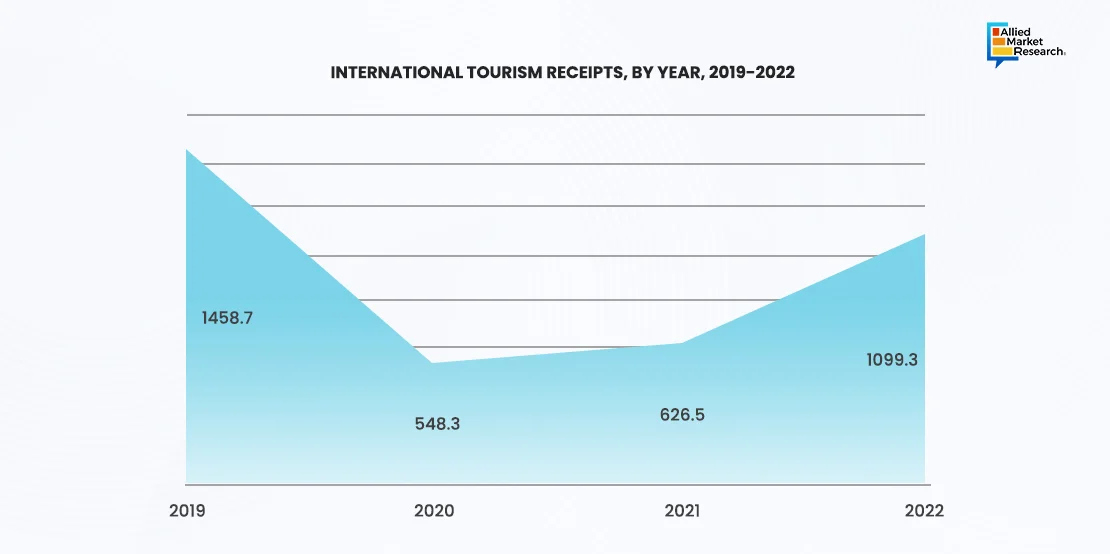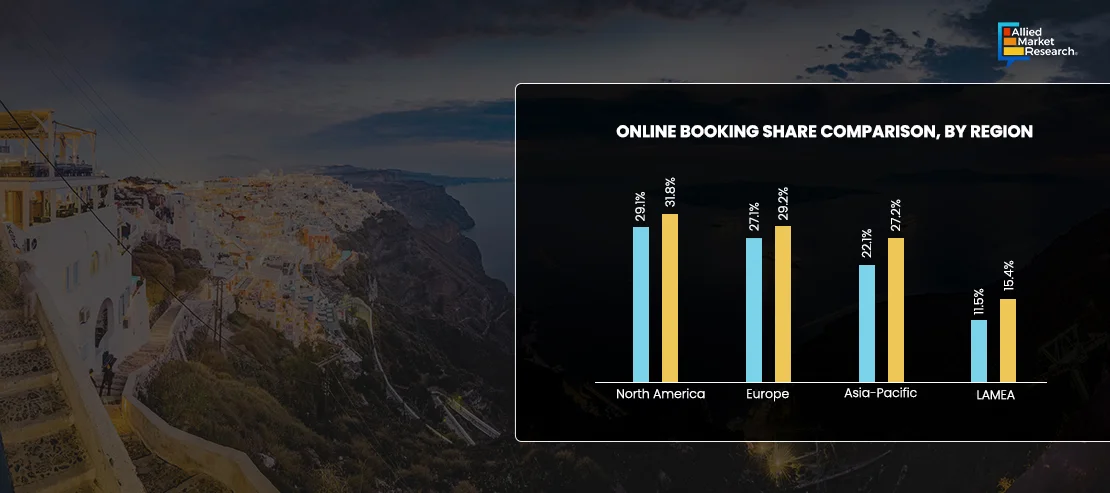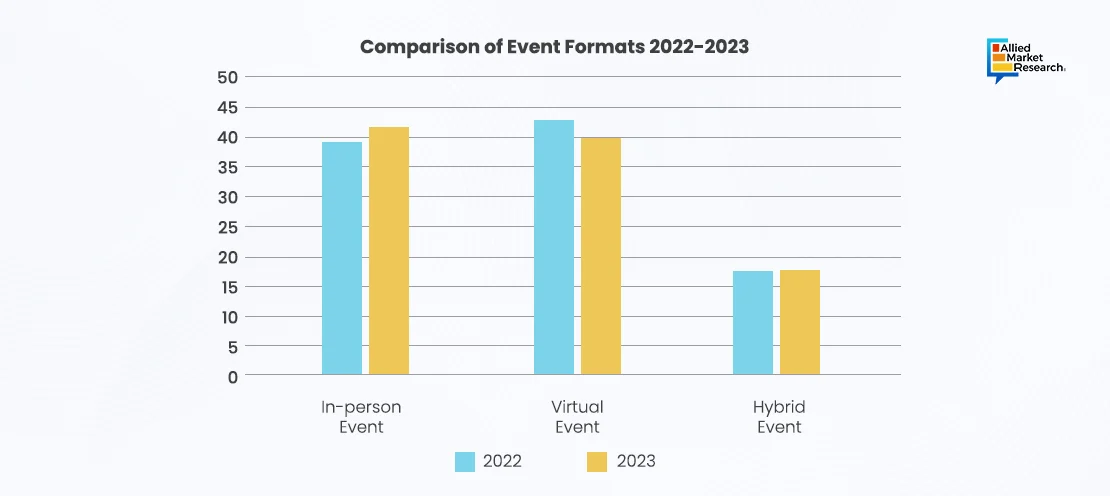Table Of Contents

Roshan Deshmukh

Shivangi Jain
Tourism Event Market: Strolling Through Its Innovation and Growth

Rise of tourism events is integral to the tourism industry as it contributes to destination development, community engagement, facilitation of cultural exchange, engagement of local communities, and diversification of tourism offerings. Tourism events generate revenue for businesses, stimulate economic growth, and create several job opportunities. In recent years, the tourism event market has undergone a remarkable transformation, evolving into a dynamic & pivotal sector within the broad travel and hospitality industry. This shift has been attributed to several key factors, including changing consumer preferences, technological advancements, and growing recognition of the economic & social benefits associated with tourism events. From the emergence of online booking platforms to the integration of virtual reality experiences, technology is reshaping the way tourists plan, experience, and remember their adventures.
In 1996, Expedia, an online travel agency, revolutionized the industry by launching one of the first online travel booking platforms, offering users the convenience of booking flights, hotels, and rental cars from a single website. Moreover, the introduction of smartphones facilitated the rise of mobile applications dedicated to travel and tourism, providing users with instant access to information, reviews, and booking options on the go. A survey conducted by TripAdvisor, an American travel platform, discovered that 76% of travelers are influenced by social media content when planning their trips, underscoring the significant role of social media in shaping the dynamics of the tourism event market. Furthermore, the COVID-19 pandemic accelerated the adoption of contactless technology and digital payments in the tourism event market, enabling safer & more convenient transactions for travelers as well as event organizers. According to a study by Mastercard, 79% of respondents expressed a preference for contactless payment methods while traveling, highlighting the growing demand for seamless and secure digital transactions.
The Dynamic Landscape: Unsteady Yet Evolving
The tourism event market experienced a gradual recovery around the globe in 2023, following the disruptions caused by the COVID-19 pandemic. There was a resurgence in international tourism activity as the vaccination drive progressed and travel restrictions eased in several parts of the globe. However, the recovery was uneven across regions, owing to differences in policies. Travel trends in 2023 reflected a significant emphasis on safety and hygiene, with travelers prioritizing destinations with robust health protocols. As per UNWTO data, international tourism receipts reached USD 1.4 trillion in 2023 according to preliminary estimates, about 93% of the USD 1.5
According to the first UNWTO World Tourism Barometer of the year, international tourism ended 2023 at 88% of pre-pandemic levels, with an estimated 1.3 billion international arrivals. The unleashing of remaining pent-up demand, increased air connectivity, and a strong recovery of global tourism destinations & markets are expected to underpin a full recovery by the end of 2024.

Online Ticketing Platforms: Influential Role in Elevating the Market
Traditionally, sale of tickets through offline counters generated a huge revenue for the event organizers. However, in the past decade, rapid penetration of the internet has shifted the revenue generation to online tickets sales. This online booking system has played a significant role in boosting the growth of the tourism event market. This is attributed to its multifold benefits such as elimination of the need to stand in long queues, ease of cancellation, improved customer management, and better deals. Internet has made the process of booking tourism tickets more convenient, efficient, and customizable for travelers.
As the graph indicates, different regions around the world have witnessed an increase in online ticket booking, especially after the COVID-19 pandemic. Along with the need to avoid crowd, rapid emergence of digital technologies, rise in the adoption of smart devices, and increase in the number of internet users have boosted ticket booking from different online booking platforms such as Ticketmaster, StubHub, Book My Show, and SeatGeek.

Current Digital Trends: Revolutionizing the Outlook of Tourism Event Market
One of the key trends shaping the tourism event market includes surge in popularity of experiential travel where travelers seek authentic and immersive experiences, which allow them to connect with local cultures and communities. Fever, a New York-based data-steered experience and entertainment company, helps individuals to discover local events. The goal of the company is to expand experiences around the world by empowering creators with technology and data.
The integration of social media into tourism events is transforming the landscape of the market. Social media platforms are contributing significantly to create a buzz for events occurring across regions. It serves as an excellent platform for organizers & attendees for interaction and sharing real-time information. It enables organizers to prompt their promotions targeting the specific set of audience, hence enhancing the chances of event success. Moreover, artificial intelligence (AI) is revolutionizing the way tourism events are marketed, planned, and experienced; with AI-driven personalization and chatbots enhancing customer engagement & satisfaction. Event organizers are utilizing AI algorithms to analyze data and predict traveler preferences, enabling targeted marketing campaigns and personalized recommendations for the travelers.
Hybrid Events: An Optimistic Possibility
Hybrid events, which blend in-person and virtual components, are enabling organizers to reach broader audiences while offering flexibility to the attendees. Presently, both in-person and virtual events flourish for distinct purposes: physical gatherings encourage direct engagement & palpable encounters, whereas virtual platforms provide advantages in accessibility & safety. Hybrid events are a great solution for tourism event planners who wish to connect with internation audiences. Moreover, these events offer the planners a positive return on investment in a short duration. However, in comparison to in-person and virtual events, hybrid tourism events are currently witnessing less popularity among attendees due to logistical complexities and uncertainties, including lack of technological integration & synchronization.
Nonetheless, as the world navigates beyond the pandemic, the number of hybrid tourism events are increasing, offering the best of both worlds by combining the advantages of in-person engagement with the accessibility & scalability of virtual platforms. This trend reflects a strategic shift toward leveraging digital technology to enhance event accessibility and engagement. The use of gamification technology, augmented reality (AR), and virtual reality (VR) is helping to fill the void between online and in-person experiences. Furthermore, hybrid tourism events synchronize with the goal of sustainability, as they eradicate the need for attendees to travel and for organizers to gather vast physical resources. Advancements in technology and growing recognition of the benefits of hybrid approaches are expected to fuel this trend, creating more inclusive & flexible event experiences in the future.

Impediments To Be Addressed
While tourism events are excellent for amusement, they pose certain risks and challenges that organizers are required to address. Environmental impact, including waste generation and energy consumption, necessitates the adoption of sustainable practices to minimize harm to local ecosystems. Organizers now strive to adopt sustainable approaches owing to surge in consumer demand for eco-friendly experiences. Apart from the conventional eco-friendly measures such as carbon offsetting, waste reduction, and energy efficiency; organizers are establishing ecosystem monitors to watch the environmental effect in real time. This includes the incorporation of sensors and use of multiscale data to predict the environmental condition.
Furthermore, economic vulnerability, security challenges, and reputation management underscore the need for comprehensive risk management strategies in tourism events. Organizers are expected to adopt proactive measures and promote responsible tourism practices, to maximize the positive impact of tourism events. Implementation of advanced surveillance systems, including CCTV cameras & facial recognition technology, is expected to enhance situational awareness and enable prompt response to security incidents. In addition, mobile applications can be utilized for real-time communication between security personnel & event organizers, facilitating rapid coordination and deployment of resources. The adoption of biometric authentication and RFID technology for access control can enhance the integrity of perimeter security, while drones may provide aerial surveillance for large-scale events. Moreover, leveraging data analytics and artificial intelligence algorithms can help identify potential security threats through pattern recognition and predictive analysis, enabling proactive risk mitigation measures.
Journey Toward the Future
The future of the tourism event market shows promising signs of innovation and progression. The adoption of hybrid event formats is expected to continue, with around 70% of event organizers planning to incorporate virtual components into their future events. This is owing to rise in searches for hybrid events over the past few years by the audience. On average, 56% of hybrid event attendees join the in-person event and 44% attend the virtual version.
In addition, the role of event technologists is projected to be crucial in the future for the streamlined operations of events, as technology is becoming mainstream in most tourism events. Moreover, digital nomadism is a new notion poised to acquire noteworthy traction in the tourism event market. As remote work culture is upsurging, several individuals are inclining toward nomadic lifestyle to work and travel in concert. This is anticipated to present abundant opportunities for stakeholders to provide adequate services to cater to the demands of digital nomads.
In conclusion, the tourism event is a vivacious industry open for varying possibilities and evolution. The advent of technology has modified the perception of tourism events among tourists. Moreover, adaptability and understanding the expectations of attendees is becoming crucial for the development of the market, with increasing demand for immersive & personalized experiences.
For further insights, get in touch with AMR analysts!

